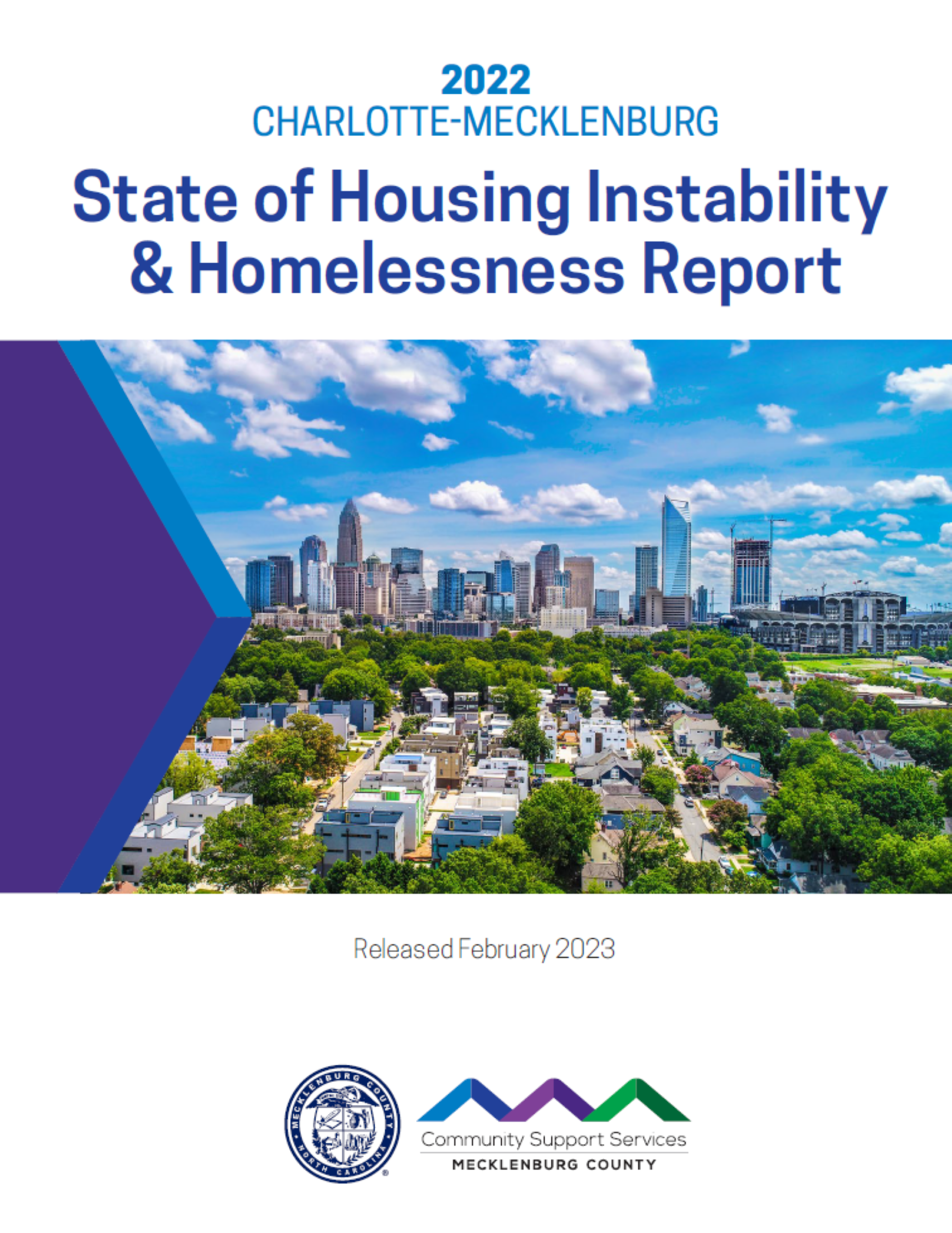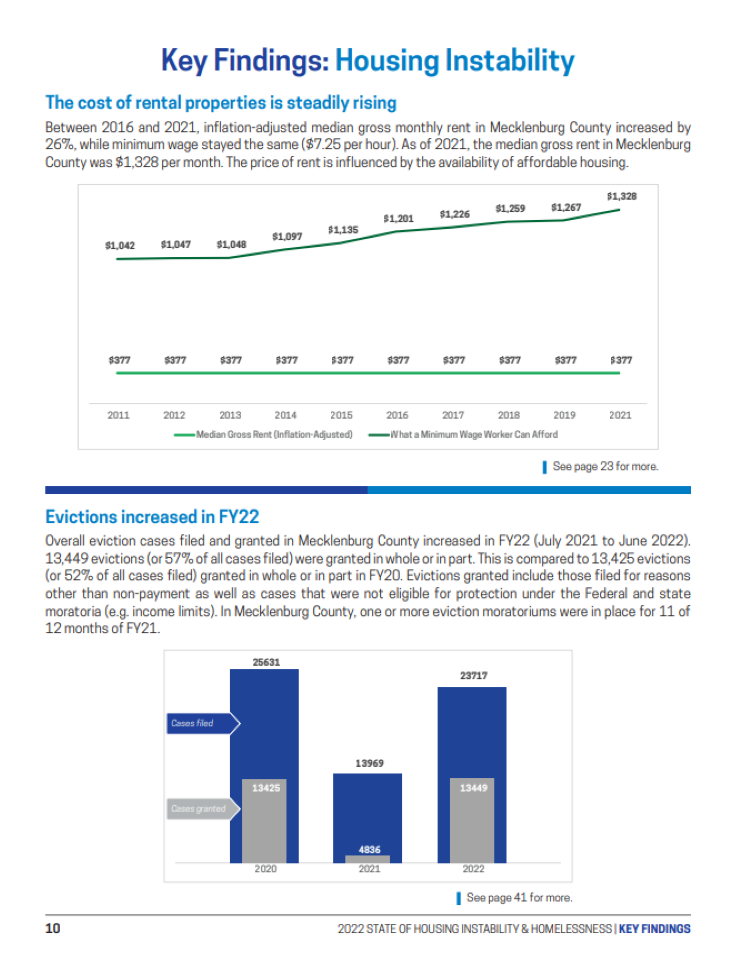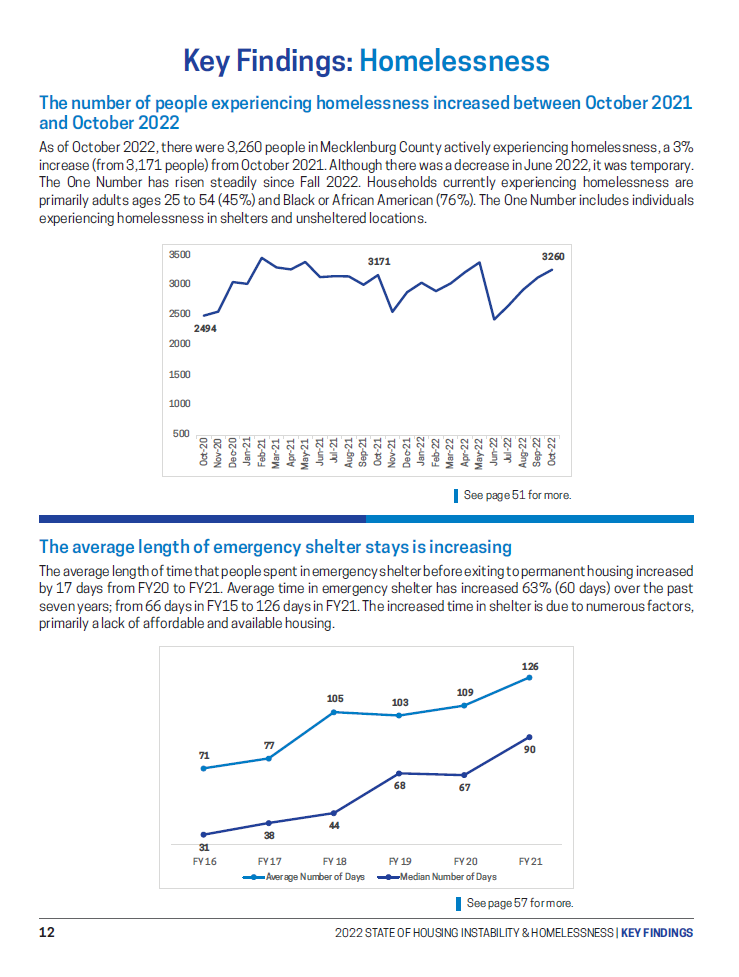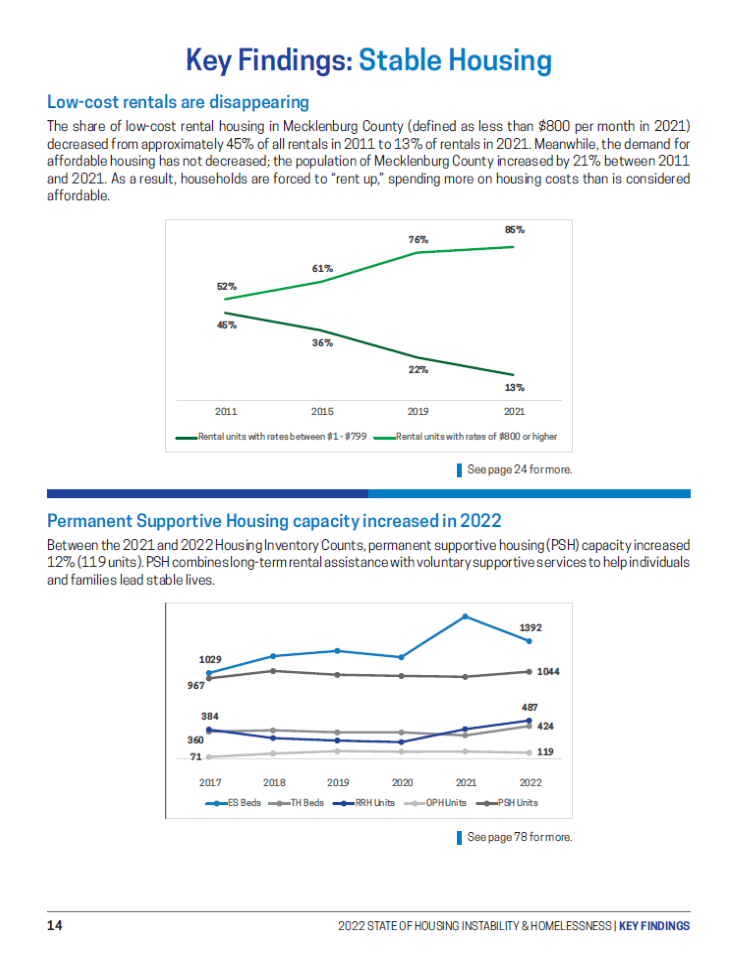Karen Pelletier
Division Director
Mecklenburg County Community Support Services
Housing Innovation & Stabilization Services Division
Today, February 23, 2023 Mecklenburg County Community Support Services released the 2022 State of Housing Instability & Homelessness (SoHIH) Report. The annual SoHIH report synthesizes, analyzes, and shares local, state, and national data with the community for stakeholders. It serves as the foundation Charlotte-Mecklenburg utilizes to better understand gaps and inform policy and funding decisions and solutions. This year is the first year in which Mecklenburg County Community Support Services’ Housing Innovation and Stabilization Services Division (HISS) fully authored the report. UNC Charlotte’s Urban Institute has provided consultation during this transition in order to maintain the intention and integrity of this report. Going forward, the SOHIH will build on the success of previous reports produced by UNC Charlotte’s Urban Institute and will continue to provide data on the full housing continuum to the community.
This blog post outlines the key findings from the 2022 SoHIH and what it could mean for Charlotte-Mecklenburg.
KEY FINDINGS
Each year, the SoHIH incorporates new data and/or resources to help describe, contextualize, and quantify components along the entire housing continuum. In addition to new or updated data related to the continuum, the 2022 SoHIH report includes data underscoring the link between housing age and affordability; new information on the systemic & structural causes of housing instability and homelessness; and information on both the capacity of and demand for housing related services in Charlotte-Mecklenburg.
WHAT WE KNOW
- The number of people experiencing homelessness in Charlotte-Mecklenburg continues to increase: As of October 2022, there were 3,260 people in Mecklenburg County actively experiencing homelessness, a 3% increase (from 3,171 people) from October 2021.
- Low-cost rentals are disappearing: Low-cost housing for low-income households now accounts for 13% of the total housing stock, down from 45% in 2011.
- More low- and moderate-income households are struggling to afford and keep their housing: Lag in incomes increasing at the same rate as housing costs is a contributing factor to the number of rental households in Mecklenburg County who are housing cost burdened increasing 51% since 2011
- Households are remaining homeless longer: The average length of time that people spent in emergency shelter before exiting to permanent housing increased by 17 days from FY20 to FY21. This measure has steadily increased by 63% in the last seven years.
FOR MORE INFORMATION
This annual report annual report combines current local, regional, and national data into a digestible and informative format to illustrate the full housing continuum. The report is anchored in three main sections: homelessness (i.e. in shelters and unsheltered), housing instability, (i.e. doubled up, housing cost-burden), and stably housed (permanent and affordable). The report also features data from the 2022 Point-in-Time Count, housing inventory and rental gaps information, Housing Trust Fund, and US Department of Housing and Urban Development’s system performance metrics.
The report is formatted in this way so that data and resources related to any phase in the continuum can be easily found. In addition, the three key findings for each of the report sections are available as separate, downloadable PDFs. There is also a fact sheet that distills the essential housing instability and homelessness indicators (with key definitions) into a single page (front and back) document.
WHY DOES THIS MATTER
The 2022 State of Housing Instability & Homelessness Report provides a single, dedicated compilation of all the latest data on housing instability and homelessness pertaining to Charlotte-Mecklenburg. This resource can be used by a variety of stakeholders who are working to understand and solve for housing instability and homelessness. It also sets a platform for measurement in the nature and level of need.
Most importantly, the SoHIH report keeps us focused on the ongoing and continued need in Charlotte-Mecklenburg. It stresses how imperative it is to advocate for deeper investment to expand safe, decent, and affordable housing, for policy changes such as the Source of Income Protection set forth by both the Charlotte City Council and the Mecklenburg Board of County Commissioners, and to hold providers and access points to resources accountable.
Therefore, it is critical that all stakeholders use the information contained in the report to ask for for more permanent, affordable housing in Charlotte-Mecklenburg, especially for those households who have the lowest incomes. To share the key findings and indicate ways to employ the report, Mecklenburg County Community Support Services has also released a community toolkit, which can be downloaded via this link.
The 2022 SoHIH report and all complementary material can be found on the Charlotte-Mecklenburg Housing & Homelessness Dashboard https://mecklenburghousingdata.org/state-of-housing-instability-homelessness-reports/
SIGN UP FOR BUILDING BRIDGES BLOG
Karen Pelletier is the Director of Housing Innovation and Stabilization Services with Mecklenburg County Community Support Services. In this position, she supports and leads data-driven work to solve for housing instability and homelessness. She is also responsible for ensuring best practice implementation of Mecklenburg County-funded housing and homeless programs.





